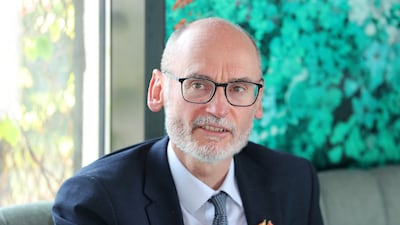Heavily armed militias operating outside of state control are a "cause for chaos", Britain's ambassador to Iraq told The National on Wednesday, after a surge in attacks on foreign troops and shipping in the region since the Israel-Gaza war began two months ago.
American and other foreign troops have been attacked at least 50 times in Iraq and Syria since Israel began a devastating siege and military operation in the Gaza Strip in retaliation for the deadly cross-border attack by Gaza militants on October 7.
Some of the attacks have been claimed by the Islamic Resistance in Iraq, which some experts say is a collective term adopted by Iran-backed armed groups to operate anonymously under Tehran's orders.
Among the targets were Al Asad in Anbar province, a military base near Baghdad's international airport and Al Harir airbase in the northern city of Erbil, both of which house American and other foreign troops operating in Iraq as part of the Global Coalition against ISIS.
Ambassador Stephen Hitchen said there was a significant number of British troops at Iraqi military bases and their lives were at risk.
"We are not out of the woods, it's an ongoing question for us with the Americans, the Iraqi government – we are all on the same side, none of us want these attacks to happen," Mr Hitchen told The National on a visit to the UAE.
"It will take years to solve this problem and in the meantime Iraq will remain a fragile environment."
"Stopping the attacks is hard, it's genuinely hard."
Mr Hitchen said armed Iraqi groups had now been given longer-range weapons.
"If they were only firing them from 5 kilometres away, or 10km away, you can patrol that area. But if you put 100km, it's an enormous area, you can't control it.
"The difference now, I think, is the kind of weaponry that they have is far more serious than it used to be," he added.
"Militias out of state control with that kind of weaponry is a cause for chaos ... it's no secret that they are trained and funded by Iran.
"It's not just a question of giving them the ability to defend themselves. It's a question of using them as a strategic tool," he said.
Iraq in 2016 passed a bill recognising militia groups fighting ISIS, collectively known as the Popular Mobilisation Forces, as a government body operating alongside the military. It gave militia members salaries and pensions that mirrored those of the military and police.
However, the militias, which are backed strongly by Iran, have publicly stated US and foreign assets will continue to be targeted as long as Washington backs Israel in the war on Gaza.
Mr Hitchen said the recent attacks were motivated not only by the Gaza war but also by "internal Iraqi affairs", with elaborating.
"We are invited to be there and were invited to help the Iraqis [to fight] ISIS and then ISIS isn't finished," said the ambassador. "It's sort of down but it's not out. And there are lots of things left to do."
New era in British-Iraqi relations
Mr Hitchen said the UK was seeking to deepen its "positive and historic" relationship with Iraq, which has been dominated by security issues for the past 20 years.
"What we want now is to widen it to lots of different files. So, water and climate ... drugs is a growing problem in Iraq," he said.
Iraqi Prime Minister Mohammed Shia Al Sudani is set to make an official visit to London next year, although dates have yet to be announced.
Mr Hitchen said Mr Al Sudani's visit would reflect the "breadth of the relationship".
"It's very important for us, I think it will be quite wide-ranging," he said. "This is not just about military or security matters, it's also about much wider development and economic issues.
"I think now the time has come to help Iraq and to develop a joint relationship which is much broader," he added.
Iraq is now a country of "possibilities", not merely a "country of risk".


